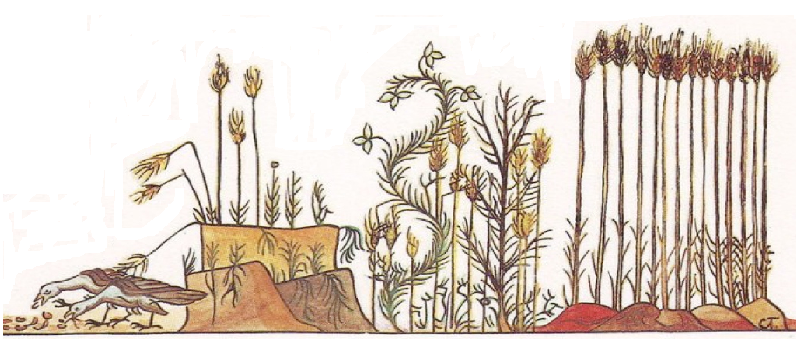
by f. Luis CASASUS, General Superior of the men’s branch of the Idente Missionaries
New York, July 12, 2020. | XV Sunday in Ordinary Time.
Book of Isaiah 55: 10-11; Letter to the Romans 8: 18-23; Saint Matthew 13: 1-23.
A parable is like the wick of a candle: is something very small, and yet, even if its light is dim, it can make one find a treasure.
The Parable of the Sower has, no doubt, many hidden treasures, for Jesus is careful to explain it in detail to his disciples. Although it is inexhaustible, among other things, we are invited to know better our soul, the soil where the seed falls.
The Parable of the Sower is not about four categories of persons, but four interior dispositions that are found in each of us in different moments and varying proportions.
Jesus is explaining to us how we waste most of the messages that the Holy Spirit sends us. In every one of us, good soil, thorns, rocks, and arid soil will always be together.
How many ways does God talk to us? Of course, there is no limit. Laws of communication or language do not constrain him. From our perspective and experience, we know his voice reaches us through three channels: the faculties of our soul, the events around us, and – above all – through our neighbors.
The first thing striking in this Parable is that the Sower throws the seed in abundance: on the roads, on the rocks, by the brambles… in all kinds of soil. This is undoubtedly the first observation to be made: the abundance of signs and signals that God sends us, which is contrary to what we sometimes feel and say, even claiming that He has forgotten us.
We have to remember that a seed, which ordinarily comes to us from God, is very small. Generally, nothing spectacular. Even the life of Jesus went unnoticed by many people. No doubt John the Baptist was better known than He was.
This suggests that the Word, what is sown by God in our hearts, deserves special, detailed attention.
First of all, as in scientific observation, we must be aware of specific details of some unexpected or “illogical” things, which turn out to be the key to discoveries, to new paths. The same goes for a musician who truly aims to master his instrument. A famous violinist, Fritz Kreisler, confessed:
Narrow is the road that leads to the life of a violinist. Hour after hour, day after day, and week after week, for years, I lived with my violin. There were so many things that I wanted to do that I had to leave undone; there were so many places I wanted to go that I had to miss if I was to master the violin. The road that I traveled in was narrow, and the way was hard.
Why should it be different in our spiritual life, in our relationship with God?
What can prevent us from being aware of these key experiences? Essentially, distractions, superficiality and ambition.
We propose today to make a diagnosis of our disability, of our limitation to receive these messages of the Holy Spirit, which are not limited to the written Gospel and the Church’s doctrine.
We have to admit that one can overcome these spiritual and emotional disabilities can; they are not absolute or permanent. As a first step, we need to be more aware of them, identify them, and know how they paralyze us and prevent us from hearing God’s voice.
Distraction of our Mind. We said that the Holy Spirit touches the faculties of our soul. There is nothing magical or spectacular here, although some people, at times, have extraordinary experiences. But the seed that falls into our thoughts, such as an initiative, or into our will, such as the impulse to forgive, is taken away by the birds or by the devil (Mk 13:4, 15). We may think that this takes place in a dramatic way, as a titanic struggle against temptation, a sharp dilemma between good and evil. But this is rarely the case.
That is why Jesus speaks of little birds, birds that do not appear to be dangerous, and that turn out to be nothing less than instruments of the devil and end up devouring the seeds.
Jesus does not say that seeds are destroyed by some catastrophic event, or by any animal that symbolizes something terrible or negative in the Bible. Now it is not dragons, snakes, or scorpions, but seemingly harmless birds.
Of course, a road is not the best place to sow, because people, animals, vehicles pass by; even a small breeze can blow away what falls there. The devil does not have to make much effort. Just as the Holy Spirit sows in our minds generous ideas and possibilities to imitate Jesus, the devil sends a cloud of useless thoughts, memories, and curiosities that are like those birds in the Parable: discreetly and silently, literally enchanting, captivating, they kill the seed. Christ is not talking about lions or monsters that devour us. They are ideas, thoughts of innocent appearance, which occupy the place that the Holy Spirit wished to have in us.
We could say that this is the first obstacle we put in the way of the Holy Spirit, the first symptom of our spiritual deafness: Distraction. This is the devil’s greatest victory: there is no combat, we are not even aware of his presence. We are capable of calling anyone who speaks to us of the devil’s action in those moments an exaggerated, obsessive, or fanatic. Our picture of the evil one is sometimes that of the less educated people of the Middle Ages: we imagine a terrible-looking being, with horns and a trident, but never a little bird, as Jesus suggests in this Parable.
Possibly, the figure of Martha shows, above all, this attitude. She was distracted by all the things she just had to do. Which in actuality, she just needed to sit at Jesus’ feet. She was distracted by activities that were not negative or immoral, but which completely absorbed him. (Lk 10:38-42). Let us point out that distractions need NOT lead to bad actions. Their existence is sufficient to separate our mind from God and thus make the fulfillment of His will in us impossible.
Superficiality in our will is probably our second spiritual disability. Jesus says it clearly: that which is sown by the Spirit has no deep roots. These are the occasions when we recognize where inspiration comes from, but refuse to make an effort to welcome it. That is Superficiality, which can be called unwillingness, spiritual laziness, inconsistency or childishness. This is the soil that is not deep.
Let us note that Christ does not speak of conflicts, of alternative possibilities. Here there is no struggle, but a superficial logic, simply instinctive, which leads me almost unconsciously to say: No. That is too much. Or, I have other things to do. Or, Now it comes to me to say this.
Here is the fear of commitment, of any kind of effort, of losing my comfort, my time, my habits.
There is no apparent conflict, but a lack of esteem, lack of perspective, not appreciating the moment. In many of us, this manifests itself in actions with no real purpose: conversations that do not teach or inspire, whims about food or the schedule, and, above all, the search for affection at any price.
In his apostolic life, Jesus often encountered this attitude. For example, when he complained bitterly about the spiritual blindness and low esteem of the inhabitants of two towns where he had performed many miracles:
You people of Chorazin are in for trouble! You people of Bethsaida are in for trouble too! If the miracles that took place in your towns had happened in Tyre and Sidon, the people there would have turned to God long ago. They would have dressed in sackcloth and put ashes on their heads (Mt 11: 21).
The consequences of this superficiality are dramatic because people like us, who have received and welcomed grace in many ways, take a step backward, or abandon our mission or commit a betrayal.
The rocky ground represents our third spiritual disability. Christ speaks in this case of the desire to be rich. It is about Ambition. We should not think that it merely refers to the ambition to have a lot of money or comforts. Nor does it mean political power. These are examples of ambition, but the most frequent ones, those that threaten you and me every day, are attachments, true addictions to my opinions, preferences, or desire for success.
Here there is a collision, a direct clash with the word of God. It is about choosing between freedom and slavery. We all have opinions, preferences, and a desire to succeed, which is not inherently wrong. But we often become slaves to them. Our Father Founder, Fernando Rielo, called this slavery attachment to the world, to judgments, desires, and the instinct for happiness.
Especially powerful is the instinct for happiness: we want satisfaction, to see immediate fruits in all our efforts, gratitude, acceptance, to see how others change, and we want to be understood…
All this fits in with the word Ambition, one of our most powerful limitations in listening to God. You can call it sin, vice, predisposition or whatever you like, but Christ always gives us a way to overcome it. Paradoxically, we are afraid to stop being slaves. This is “fear of freedom,” as a famous 20th-century philosopher said. Ambition is capable of distorting and contaminating our entire capacity for union with God and our neighbors, which resides in the unitive faculty.
As we said at the beginning, the Holy Spirit speaks to us through our faculties, the events we see and our neighbor. Regarding the events that happen next to us, also Distraction, Superficiality, and Ambition make us blind to how God (sometimes paradoxically) wants to tell us something new through them. These months, we have seen many people turn to God in the face of the pandemic’s devastating effects.
But there are many everyday realities, such as having some health or seeing the sunrise, or someone doing us a favor, that should lead us to God, for example, with an act of gratitude.
I would like to end by recalling the most important channel that God uses to communicate with us: our neighbor.
We have all heard that we must love our fellowmen, including our enemies. This is often explained by saying that they are children of God and deserve compassion, like the one each of us receives from God. But there is something else. Without a doubt, the Holy Spirit wants to tell us something important through our friends’ and enemies’ lives. We ignore this message over and over.
More than one sensitive person has claimed that he learned a lot from those who loved him, but he learned even more from those from whom he received hate and misunderstanding. In these cases, through those human beings, God makes us see that there is always something that He expects from us, something that we can do even if that person seems insensitive, selfish, and unpleasant.
Maybe, through my enemies, through the scandals of many people, God wants to show me the most important changes I have to make in my life.












